Module 2 Public holidays.Unit 1 My family always go somewhere interesting as soon as the holiday beg
文档属性
| 名称 | Module 2 Public holidays.Unit 1 My family always go somewhere interesting as soon as the holiday beg |
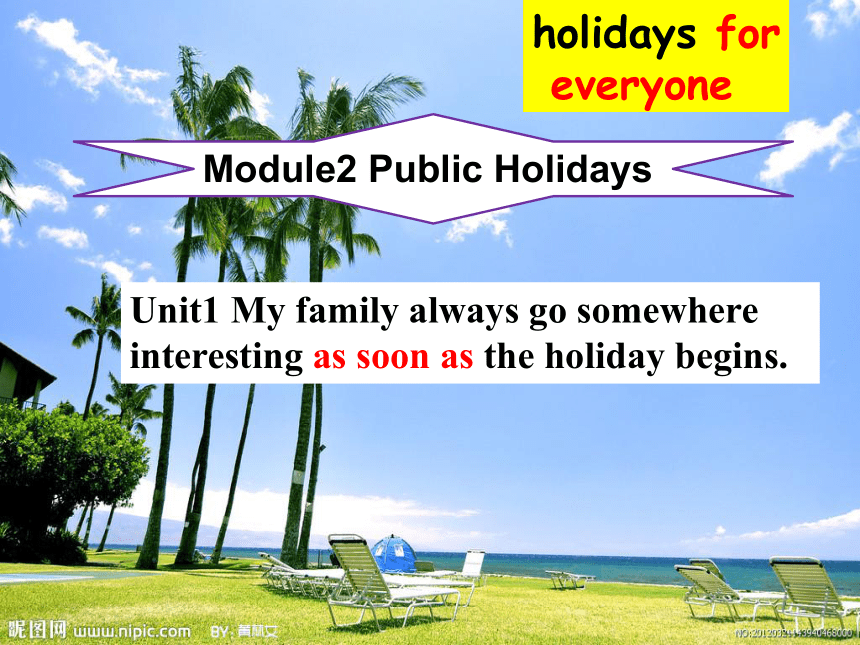
|
|
| 格式 | zip | ||
| 文件大小 | 6.1MB | ||
| 资源类型 | 教案 | ||
| 版本资源 | 外研版 | ||
| 科目 | 英语 | ||
| 更新时间 | 2017-12-05 00:00:00 | ||
图片预览

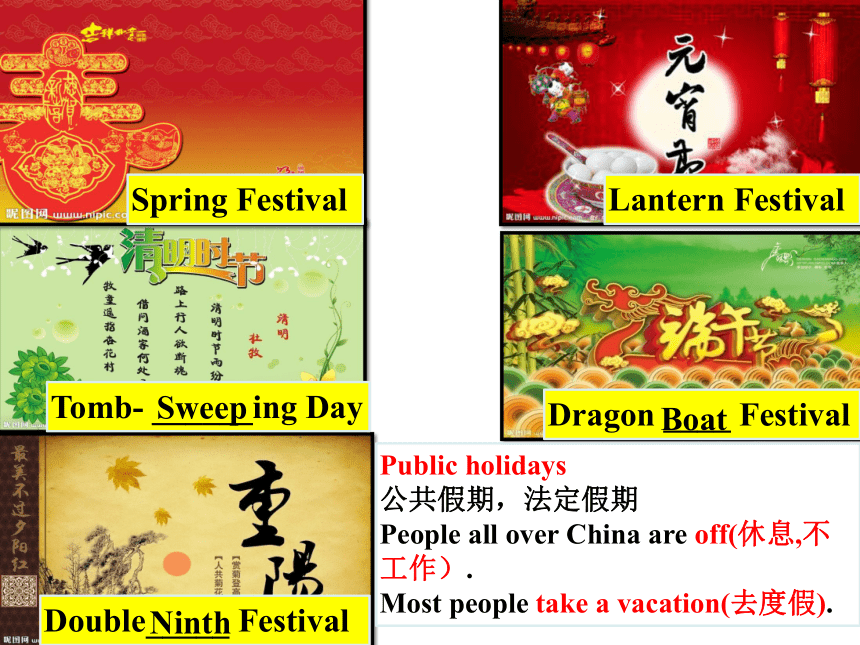
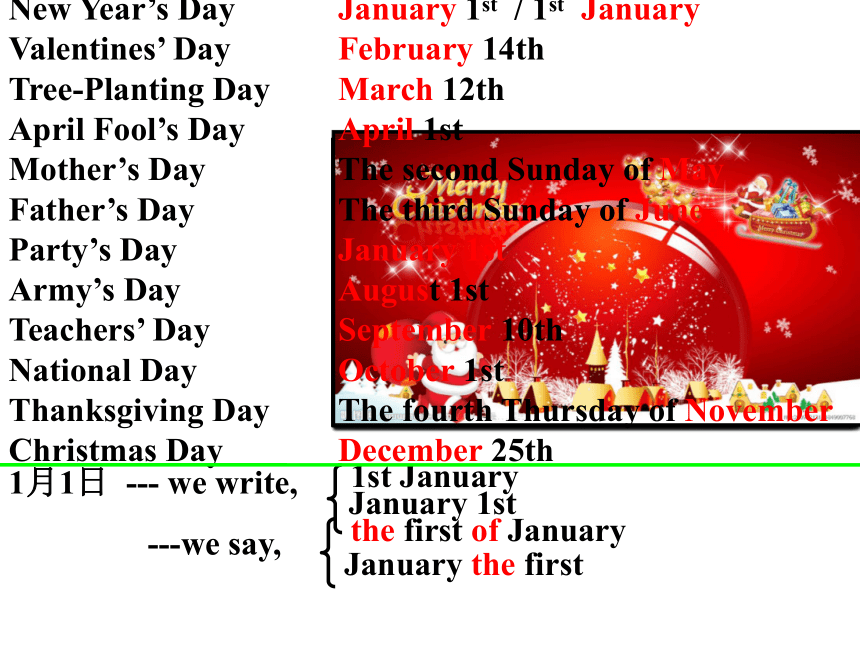
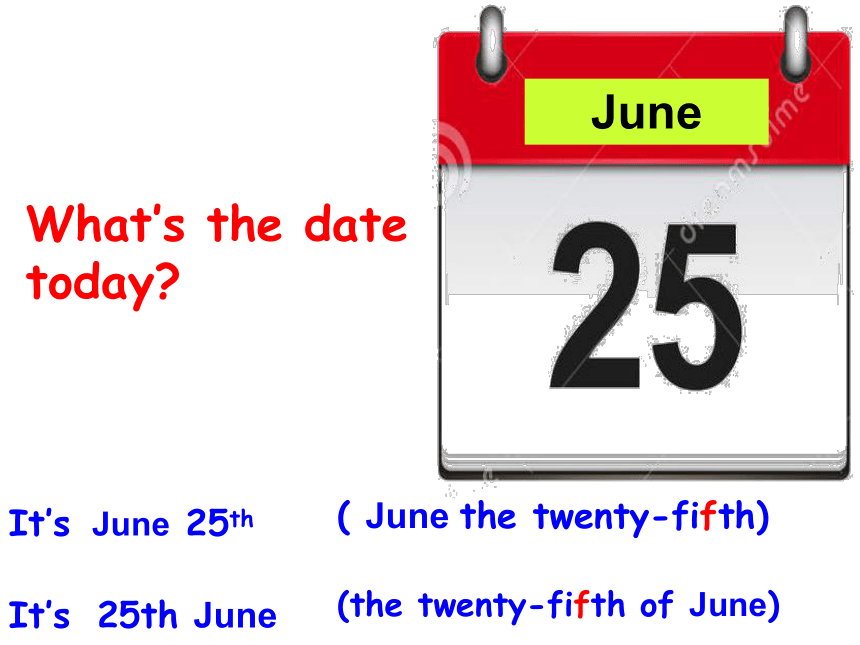
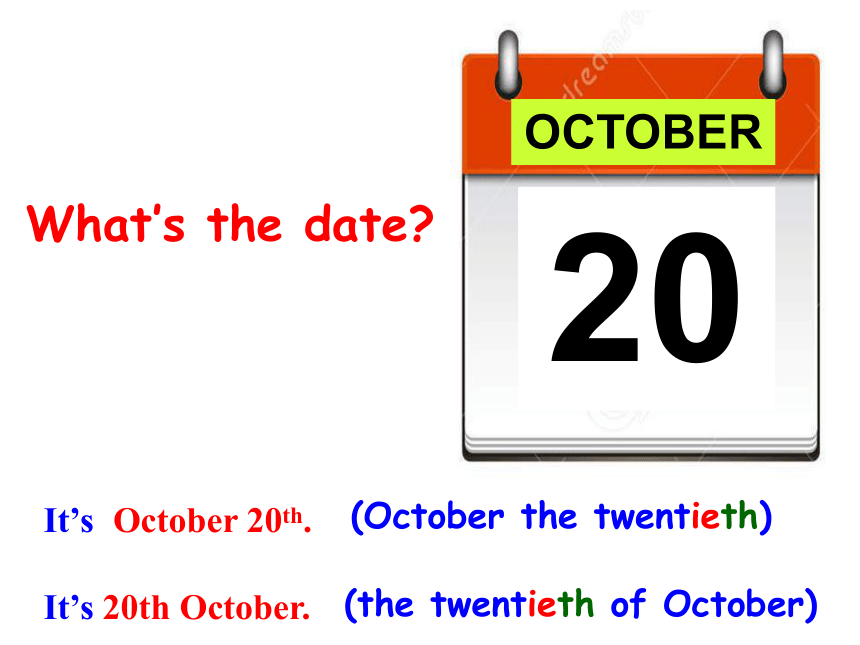
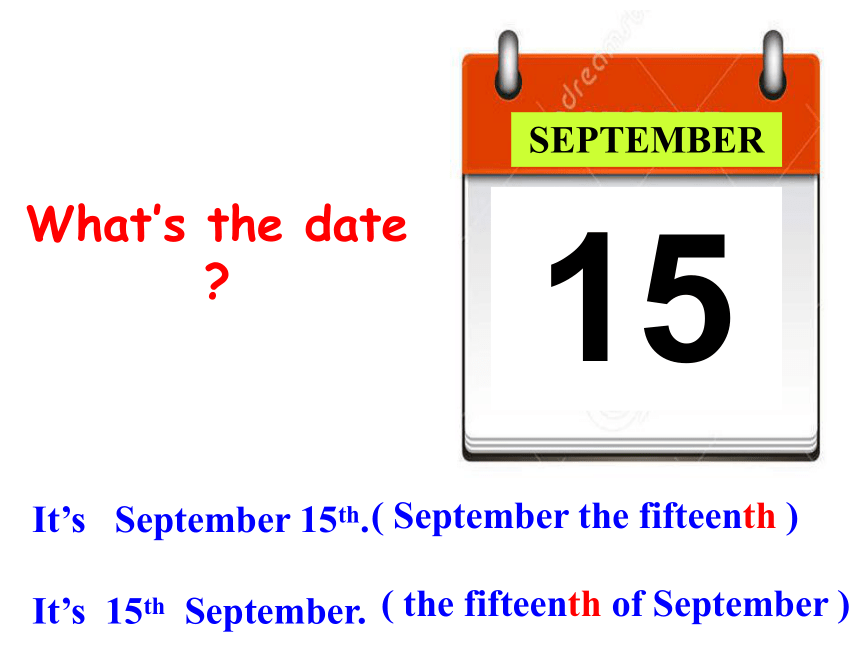
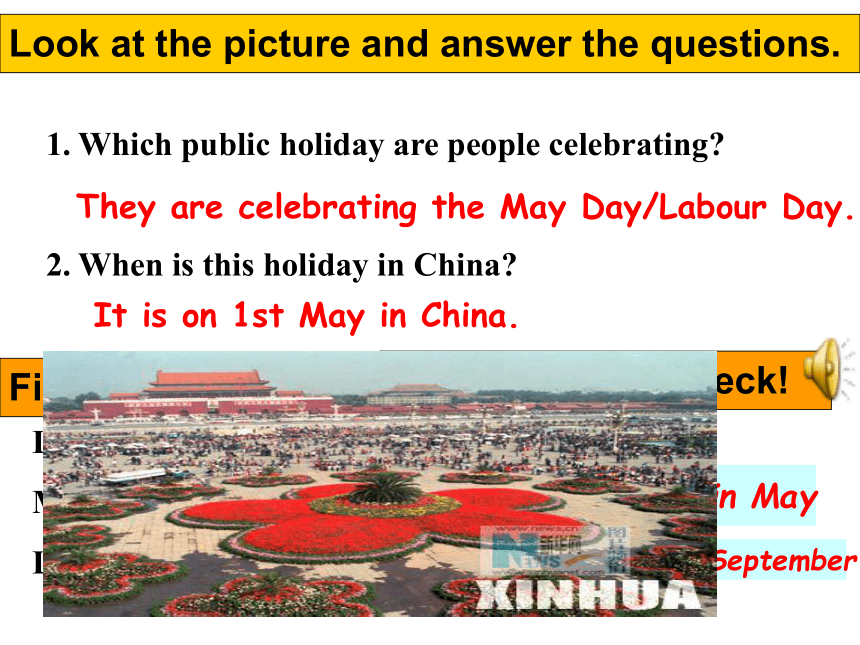
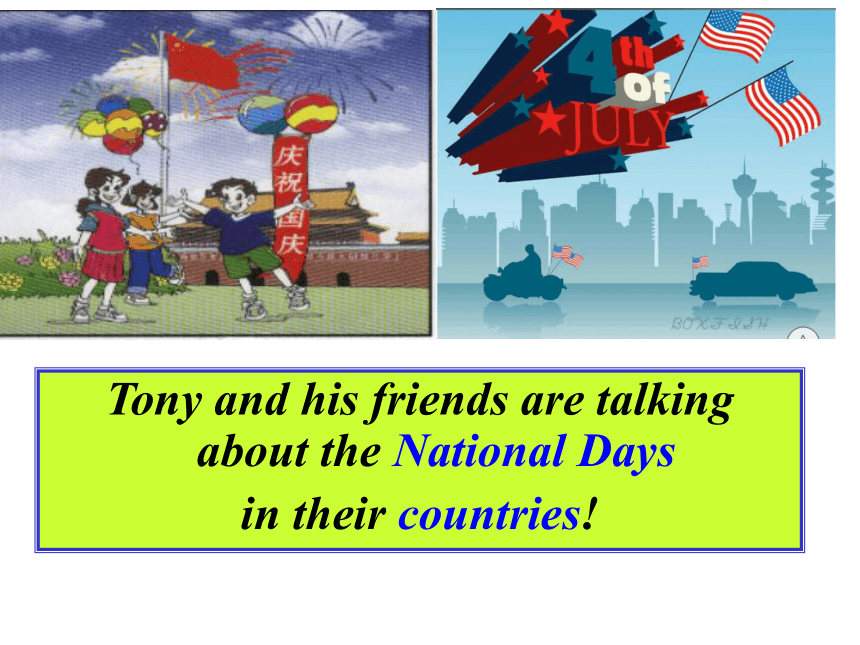
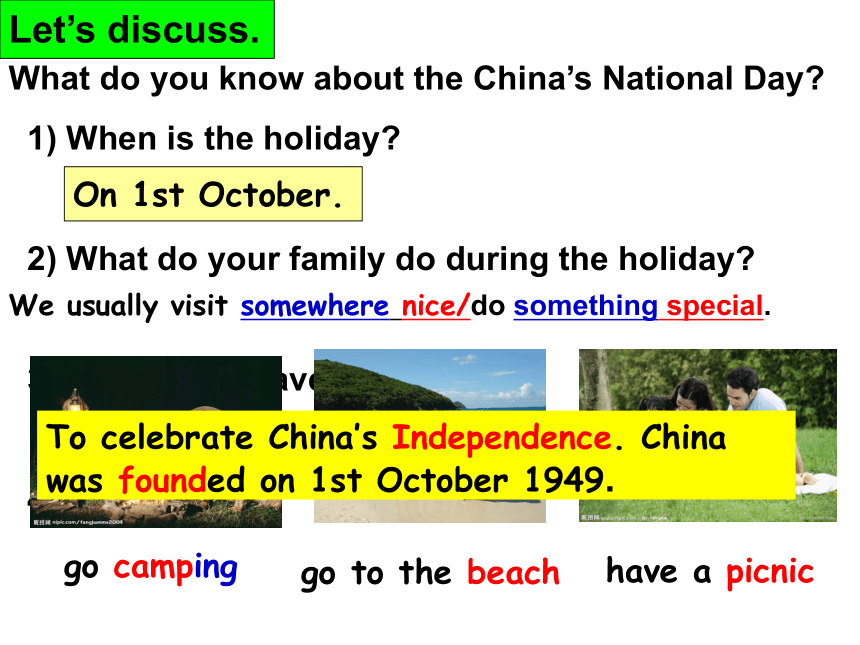
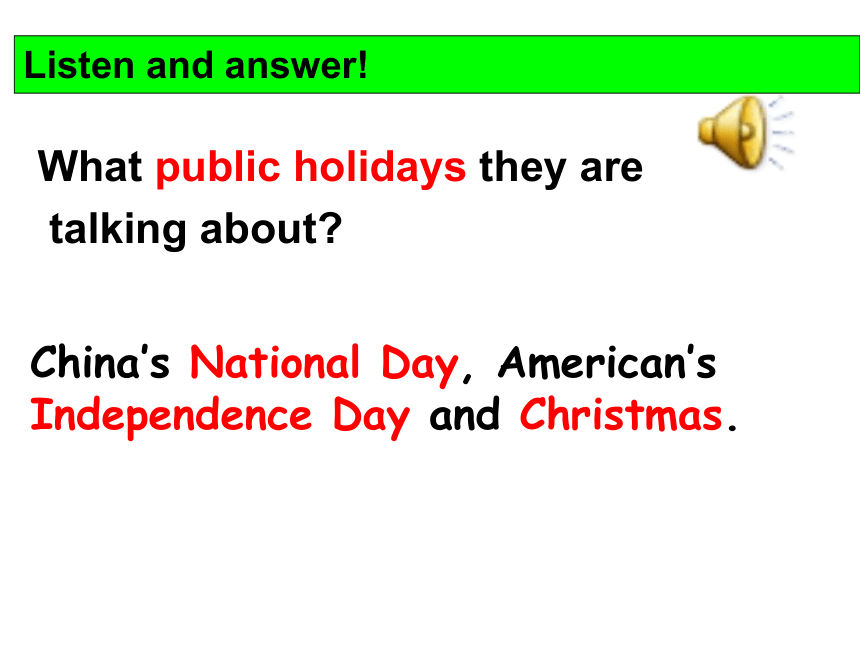


文档简介
课件50张PPT。Module2 Public HolidaysUnit1 My family always go somewhere interesting as soon as the holiday begins.holidays for
everyoneDouble_____ FestivalDragon ____ FestivalTomb- ______ing DaySpring FestivalLantern FestivalNinthBoatPublic holidays
公共假期,法定假期
People all over China are off(休息,不工作).
Most people take a vacation(去度假).SweepNew Year’s Day
Valentines’ Day
Tree-Planting Day
April Fool’s Day
Mother’s Day
Father’s Day
Party’s Day
Army’s Day
Teachers’ Day
National Day
Thanksgiving Day
Christmas DayJanuary 1st / 1st January
February 14th
March 12th
April 1st
The second Sunday of May
The third Sunday of June
January 1st
August 1st
September 10th
October 1st
The fourth Thursday of November
December 25th1st January January 1st---we say,the first of JanuaryJanuary the first1月1日 --- we write,What’s the date
today?It’s June 25th
It’s 25th June( June the twenty-fifth)(the twenty-fifth of June)JuneWhat’s the date? It’s October 20th.
It’s 20th October. (October the twentieth)(the twentieth of October)20OCTOBERWhat’s the date
?It’s September 15th.
It’s 15th September. ( September the fifteenth )( the fifteenth of September )15SEPTEMBERLook at the picture and answer the questions.Which public holiday are people celebrating?
When is this holiday in China?They are celebrating the May Day/Labour Day.It is on 1st May in China.Labour Day in China is on ____________.
May Day in the UK is on _____________.
Labour Day in the US is on _______________.Fill in the blanks.1st Maythe first Monday in Maythe first Monday in SeptemberNow listen and check!Tony and his friends are talking about the National Days
in their countries!Let’s discuss.What do you know about the China’s National Day?
1) When is the holiday?
2) What do your family do during the holiday?
3) Why do we have this holiday?
4) ……On 1st October.We usually visit somewhere nice/do something special. go camping go to the beach have a picnicTo celebrate China’s Independence. China was founded on 1st October 1949.Listen and answer!China’s National Day, American’s Independence Day and Christmas.What public holidays they are
talking about?A3. Listen to Part1 and answer two questions. When China’s National Day comes, we have
a ______ holiday.
A. one-day B. three-day C. seven-day2. What’s Lingling’s plan for the holiday this
year?
A. To visit some friends in Shandong.
B. To visit her grandparents in Shandong.
C. To spend three days in Qingdao.In the USA, the national day is called
______________________________.Independence Day (独立日)A3. Listen to Part2 and complete the table. 4th July one dayactivities1777A3. Listen to Part3 and choose the best answer. 1.( ) Tony always celebrates __________
with a two-day holiday.
A. the National Day
B. the Independence Day
C. ChristmasC2.( ) What does Tony’s family always do as soon as the holiday begins? A. have a picnic
B. go somewhere interesting
C. go shopping BNational Day
1st October
three days
________and national _______everywhere
1949Independence Day
4th July
one day
__________holiday activities,
American______eveywhere
have _________ ,
watch _______ play music
1777Retell the description.all kinds of picnicsbandsflagsflagsflowersRead and complete the table.1. The Americans celebrate Independence
Day on 4th July. It is the start of the
________ season.
2. On 1st October, you can see the national
________ everywhere in China.
3. The US was ____________ in 1776.
4. What kinds of _____________ are there
on 1st January?
activity flag found vacationvacationflagsP11 A4. Complete the sentences with the correct form of the words in the box.foundedactivities 记忆风暴(1)序数词:是指表示顺序的数词。 one—
two—
three—
five—
eight—
nine—
twelve—
其它的序数词都是由其相对应的基数词后面添加“th”构成。
例如: six—
nineteen—first
second
third
fifth
eighth
ninth
twelfth sixth
nineteenth(2)整数第几十的形式由其对应的基数词改变结尾字母y为i,再加“eth”构成。
twenty—
thirty—twentieth
thirtieth
(3)第31— ?
第56—
第73—
第99—
thirty-first ?
fifty-sixth ?
seventy-third ?
ninety-ninth1st first
2nd second
3rd third
4th fourth
5th fifth
6th sixth
7th seventh
8th eighthListen and repeat.9th ninth
10th tenth
11th eleventh
12th twelfth
13th thirteenth
20th twentieth
21st twenty-first
31st thirty-first 1st first 5th fifth 9th ninth 13th thirteenth
2nd second 6th sixth 10th tenth 20th twentieth
3rd third 7th seventh 11th eleventh 21st twenty-first
4th fourth 8th eighth 12th twelfth 31st thirty-first Numbers and Dates(日期) 1,2,3要全变,其余th添后面,八(eight)去t,九(nine)去e,以y结尾变ie,five,twelve两兄弟,ve要用fth。遇到几十几,只变个位就可以。Work in groups.1.What is your favorite holiday?
2.When is the holiday?
3.How many days are you off?
4.What do you usually do on the holiday?(special food, clothes or…)
Dragon Boat Festival Our favorite holiday is Spring Festival. It’s in January or February. We have more than twenty days off. We usually go shopping, eat some special food such as … and we wear new clothes /enjoy the ….好时节,愿得年年,常见中秋月! It's a great time
to celebrate
the Mid-autumn Day!Language pointsWhile we’re staying with our friends,
we’re going to spend one day in Qingdao.while引导的时间状语从句主语谓语宾语状语时间状语从句用句子来表达一件事情或一个行为发生的时间。...but we only have a one day off…off不上课;休息;不工作adv.I’m taking a week off over Christmas.圣诞节期间我会休假一星期。 off 作定语修饰名词,副词作定语修饰名词一般放于名词后。……但是我们只放一天假。And is there anything special on that day?那天会有什么特别的活动吗?用形容词修饰something, somewhere等不定代词/不定副词时,形容词要放在不定代词/不定副词的后面。And my family always go somewhere interesting as soon as the holiday begins.假期一开始,我们全家就回去某个好玩的地方。And my family always go somewhere interesting as soon as the holiday begins.as soon as 引导的时间状语从句as soon as 一......就……假期一开始,我们全家就回去某个好玩的地方。As soon as I see him I will tell him the news. 状语从句( I ) --时间状语从句
时间状语从句就是用一个句子来表达一件事情或一个行为发生的时间。时间状语从句根据其所表示的时间不同,所使用的连词也不同.时间状语从句常用引导词:
when当……时(从句谓语可以是延续性或短暂性动词)
while正当……时(从句谓语用延续性动词)
as soon as一……就
before在……之前
after在……之后
until直到
not …until…直到……才注:状语从句,遵循主将从现1.由before连接的时间状语从句 before表示“在……之前”,如:
他去北京前在这里学习。
He studied here before he went to Beijing.
2. 由after连接的时间状语从句 after表示“在……之后”,如:我做完功课后就和你一起出去打篮球.I will go out to play basketball with you after I finish my homework .3. 由until连接的时间状语从句
until 表示“直到”,
用not...until...引导一个时间状语从句时一般译为"直到......才......"。如: 1)他一直等到所有的人都走了.He waited until all the people left .2)直到妈妈回家后我才上床睡觉.I didn’t go to bed until Mum came back .4.由when 连接的时间状语从句
when表示“当……时候,那时” 表示一个动作紧接另一个动作发生或表示一个动作发生时另一个动作正在发生; 如:
I was doing my homework when my
father reached home我父亲到家时,我在做作业。as soon as表示“立即”,“一… 就…”
5.由as soon as连接的时间状语从句,表示主从句所述两件事发生的时间相近. 我们一到那儿就马上开始工作.We began to work as soon as we got there .6.由while连接的时间状语从句 while 表示主句的行为在从句行为过程中发生,由于从句表示一个持续的行为,所以从句中要用持续性动词或状态动词. I reached home while my mother was cooking supper. 1)他一边等车一边看报.While he was waiting for a bus, he
was reading a newspaper. 2) 妈妈在做晚饭时,我到家的. Model:
The meeting began. My father arrived. (as soon as)
As soon as the meeting began, my father arrived.
1)My mother waited for me .I came back home.(until)
2)We eat dinner . We must wash our hands . (before)
Use the words to join the sentences .My mother waited for me until I came back home.We must wash our hands before we eat dinner .
3)I arrive in New York . I will give my parents a call . (as soon as)
4)Tom watches TV every day . He finishes his homework . (after)
5)The baby is sleeping . Don’t make any noise . (while)Don’t make any noise while the baby is sleeping .Tom watches TV every day after he finishes his homework .I will give my parents a call as soon as I arrive in New York .时间状语从句when, while
when, while, as表示主句谓语作和从句的谓语动作同时发生或几乎同时发生。
①when表示点时间时,从句中用短暂性动词;表示段时间时,用持续性动词
eg.
When I got home, my family were already having dinner.
我到家的时候,全家已在吃晚饭。 (when表示点时间)
When they were still talking and laughing, the teacher came in.
当他们还在说笑的时候,老师进来了。(when表示段时间)
时间状语从句 When
当when意思是正当……时候(即 at that moment)时,when只能跟在前一分句之后。
eg. He was about to go to bed when the doorbell rang.
他正要上床,忽然门铃响了。
They were watching the World Cup when suddenly the lights went out.
他们正看着世界杯比赛,突然灯灭了。
They had just arrived home when it began to rain.
他们刚到家,天就开始下雨了。
Attention时间状语从句 while
①while通常表示一段时间,从句中宜用持续性动词作谓语。
eg. Strike while the iron is hot.
趁热打铁。
She fell asleep while she was reading the newspaper.
她在看报的时候睡着了。
②while有时可以作并列连词,表示对比,可译成……而……。
I am fond of English while he likes maths.
我喜欢英语而他却喜欢数学。时间状语从句 as
①as表示点时间时,从句中用短暂性动词;表示段时间时,用持续性动词。as和when两者经常可以通用。
eg. The thief was caught as/ when he was stealing in the supermarket.
小偷在超市行窃时被逮住了。
I saw Jim as /when he left the meeting room.
吉姆离开会议室时候我看到了他。
②as表示 一边……一边……,强调从句和主句中两个动作交替进行或同步进行。
eg. They talked as they walked.
他们边走边聊。
He looked behind from time to time as he went.
他一边走,一边不时地往后看。
③as表示随着
eg. As time goes on, it's getting warmer and warmer.
随着时间的推移,天气变得越来越暖了。时间状语从句when, while, as的用法区别
只有当从句表示的是段时间,即其谓语动词有持续性特征时,这三者可以通用互换。
eg. I got the news on the radio when/ while /as I was having breakfast.
我在吃早饭的时候从收音机里获悉这一消息。
Attention时间状语从句 b.when更强调特定时间,还可表示从句中的动作先于或后于主句的动作。
eg. When I had given Mary the spare ticket, I found my own already gone.
当我把多余的票给了玛丽时,我才发现我自己的票已不知去向。(从句动作发生在主句之前,注意主从句的时态)
When I finally got there, he meeting had been on for ten minutes.
当我最终赶到那里时,会议已开始十分钟了。(从句动作发生在主句之后,注意时态)时间状语从句c.while从句只能表示延续的动作或状态或主从句中动作的对比。
eg. She thought I was talking about her daughter, while in fact, I was talking about my daughter.
她以为我在谈论她女儿,而事实上,我在谈论我的女儿。时间状语从句 before
before表示在一段时间之前。
eg. I must finish all the work before go home.
回家之前我必须干完所有的活。
You must first learn to walk before you try to run.
在想要跑以前,你得先学会走。
He had learned English for three years before he went to London.
他去伦敦之前已学了三年英语。
before 从句往往带有否定的含义。
eg. He ran off before I could stop him.
我还没来得及阻止他,他就跑掉了。
Take it down before you forget it.
趁着还没忘记的时候就记录下来。Attention时间状语从句after
after表示在一段时间之后。
eg. Let's play football after school.
放学后我们踢足球吧。
The sun came out soon after the storm stopped.
暴风雨过后不久,太阳出来了。时间状语从句Since
since表示自……以来。表示动作从过去某一点时间一直延续到说话时间为止。主句中通常为延续性动词的现在完成时,since从句中一般用短暂性动词的一般过去时。
eg. It has been just a week since we arrived here.
我们到这儿刚刚一星期。
Where have you been since I last saw you?
自上次我见过你之后,你去了哪里?
Since she was young, she has been collecting stamps.
她自年轻时起就一直集邮至今。时间状语从句till, until
1.Until/till用于肯定句时,表示直到…为止,主句必须为持续性动词。
eg. We shall wait until/till he comes back.
我们将一直等到他回来。
Everything went well until/till that accident happened.
直到发生那意外之前,一切都正常。
2. not…until/till表示直到…才,主句通常要用短暂动词,这时until和till可用 before代替。
eg. I didn't leave until / till before she came back.
直到她回来,我才离开的。
People do not know the value of their health till until before they lose it
人们直至失去了健康才知其可贵。
3.当not until位于句首时,主句中的主语、谓语要使用倒装语序。
eg. Not until she stopped crying did I leave.
直到她不哭了,我才离开的。
4. 在强调句型中一般只用until,不用till
eg. It was not until she took off her dark glasses that I recognized her.时间状语从句whenever
whenever是when的强势语,它描述的不是一次性动作,而是经常发生的习惯性动作。
eg. You are always welcome whenever you come.
无论你何时来都欢迎。
Whenever we met with difficulties, they came to help us.
每当我们遇上困难的时候,他们就来帮我们。时间状语从句as soon as
as soon as...可译为一……就……,用来表示主从句的动作是紧接着发生的。
eg. He will come and see you as soon as he can.
他一有空就来看你。
He rushed home as soon as he got the good news.
他一得到这个好消息就奔回家。时间状语从句Attention:在时间状语从句中,不能用一般将来时、过去将来时态或将来完成时,而要用相应的一般现在时态、一般过去时或现在完成时来代替。
eg. I’ll telephone you as soon as I get there. 我一到达那里就打电话给你。
Don’t get off the bus until it has stopped. 等车停稳后才下车。If I get up late, I will be late for school.
If I don’t finish my homework, I won’t go to bed.由if引导的从句叫条件状语从句,if意为“如果” 若主句是一般将来时,从句要用一般现在时。If you join the band, you will be famous.=You will be famous if you join the band.Homework Writing a passage about a Chinese public holiday . Try to use the time adverbial clauses with when ,while,before,after,until ,as soon as
everyoneDouble_____ FestivalDragon ____ FestivalTomb- ______ing DaySpring FestivalLantern FestivalNinthBoatPublic holidays
公共假期,法定假期
People all over China are off(休息,不工作).
Most people take a vacation(去度假).SweepNew Year’s Day
Valentines’ Day
Tree-Planting Day
April Fool’s Day
Mother’s Day
Father’s Day
Party’s Day
Army’s Day
Teachers’ Day
National Day
Thanksgiving Day
Christmas DayJanuary 1st / 1st January
February 14th
March 12th
April 1st
The second Sunday of May
The third Sunday of June
January 1st
August 1st
September 10th
October 1st
The fourth Thursday of November
December 25th1st January January 1st---we say,the first of JanuaryJanuary the first1月1日 --- we write,What’s the date
today?It’s June 25th
It’s 25th June( June the twenty-fifth)(the twenty-fifth of June)JuneWhat’s the date? It’s October 20th.
It’s 20th October. (October the twentieth)(the twentieth of October)20OCTOBERWhat’s the date
?It’s September 15th.
It’s 15th September. ( September the fifteenth )( the fifteenth of September )15SEPTEMBERLook at the picture and answer the questions.Which public holiday are people celebrating?
When is this holiday in China?They are celebrating the May Day/Labour Day.It is on 1st May in China.Labour Day in China is on ____________.
May Day in the UK is on _____________.
Labour Day in the US is on _______________.Fill in the blanks.1st Maythe first Monday in Maythe first Monday in SeptemberNow listen and check!Tony and his friends are talking about the National Days
in their countries!Let’s discuss.What do you know about the China’s National Day?
1) When is the holiday?
2) What do your family do during the holiday?
3) Why do we have this holiday?
4) ……On 1st October.We usually visit somewhere nice/do something special. go camping go to the beach have a picnicTo celebrate China’s Independence. China was founded on 1st October 1949.Listen and answer!China’s National Day, American’s Independence Day and Christmas.What public holidays they are
talking about?A3. Listen to Part1 and answer two questions. When China’s National Day comes, we have
a ______ holiday.
A. one-day B. three-day C. seven-day2. What’s Lingling’s plan for the holiday this
year?
A. To visit some friends in Shandong.
B. To visit her grandparents in Shandong.
C. To spend three days in Qingdao.In the USA, the national day is called
______________________________.Independence Day (独立日)A3. Listen to Part2 and complete the table. 4th July one dayactivities1777A3. Listen to Part3 and choose the best answer. 1.( ) Tony always celebrates __________
with a two-day holiday.
A. the National Day
B. the Independence Day
C. ChristmasC2.( ) What does Tony’s family always do as soon as the holiday begins? A. have a picnic
B. go somewhere interesting
C. go shopping BNational Day
1st October
three days
________and national _______everywhere
1949Independence Day
4th July
one day
__________holiday activities,
American______eveywhere
have _________ ,
watch _______ play music
1777Retell the description.all kinds of picnicsbandsflagsflagsflowersRead and complete the table.1. The Americans celebrate Independence
Day on 4th July. It is the start of the
________ season.
2. On 1st October, you can see the national
________ everywhere in China.
3. The US was ____________ in 1776.
4. What kinds of _____________ are there
on 1st January?
activity flag found vacationvacationflagsP11 A4. Complete the sentences with the correct form of the words in the box.foundedactivities 记忆风暴(1)序数词:是指表示顺序的数词。 one—
two—
three—
five—
eight—
nine—
twelve—
其它的序数词都是由其相对应的基数词后面添加“th”构成。
例如: six—
nineteen—first
second
third
fifth
eighth
ninth
twelfth sixth
nineteenth(2)整数第几十的形式由其对应的基数词改变结尾字母y为i,再加“eth”构成。
twenty—
thirty—twentieth
thirtieth
(3)第31— ?
第56—
第73—
第99—
thirty-first ?
fifty-sixth ?
seventy-third ?
ninety-ninth1st first
2nd second
3rd third
4th fourth
5th fifth
6th sixth
7th seventh
8th eighthListen and repeat.9th ninth
10th tenth
11th eleventh
12th twelfth
13th thirteenth
20th twentieth
21st twenty-first
31st thirty-first 1st first 5th fifth 9th ninth 13th thirteenth
2nd second 6th sixth 10th tenth 20th twentieth
3rd third 7th seventh 11th eleventh 21st twenty-first
4th fourth 8th eighth 12th twelfth 31st thirty-first Numbers and Dates(日期) 1,2,3要全变,其余th添后面,八(eight)去t,九(nine)去e,以y结尾变ie,five,twelve两兄弟,ve要用fth。遇到几十几,只变个位就可以。Work in groups.1.What is your favorite holiday?
2.When is the holiday?
3.How many days are you off?
4.What do you usually do on the holiday?(special food, clothes or…)
Dragon Boat Festival Our favorite holiday is Spring Festival. It’s in January or February. We have more than twenty days off. We usually go shopping, eat some special food such as … and we wear new clothes /enjoy the ….好时节,愿得年年,常见中秋月! It's a great time
to celebrate
the Mid-autumn Day!Language pointsWhile we’re staying with our friends,
we’re going to spend one day in Qingdao.while引导的时间状语从句主语谓语宾语状语时间状语从句用句子来表达一件事情或一个行为发生的时间。...but we only have a one day off…off不上课;休息;不工作adv.I’m taking a week off over Christmas.圣诞节期间我会休假一星期。 off 作定语修饰名词,副词作定语修饰名词一般放于名词后。……但是我们只放一天假。And is there anything special on that day?那天会有什么特别的活动吗?用形容词修饰something, somewhere等不定代词/不定副词时,形容词要放在不定代词/不定副词的后面。And my family always go somewhere interesting as soon as the holiday begins.假期一开始,我们全家就回去某个好玩的地方。And my family always go somewhere interesting as soon as the holiday begins.as soon as 引导的时间状语从句as soon as 一......就……假期一开始,我们全家就回去某个好玩的地方。As soon as I see him I will tell him the news. 状语从句( I ) --时间状语从句
时间状语从句就是用一个句子来表达一件事情或一个行为发生的时间。时间状语从句根据其所表示的时间不同,所使用的连词也不同.时间状语从句常用引导词:
when当……时(从句谓语可以是延续性或短暂性动词)
while正当……时(从句谓语用延续性动词)
as soon as一……就
before在……之前
after在……之后
until直到
not …until…直到……才注:状语从句,遵循主将从现1.由before连接的时间状语从句 before表示“在……之前”,如:
他去北京前在这里学习。
He studied here before he went to Beijing.
2. 由after连接的时间状语从句 after表示“在……之后”,如:我做完功课后就和你一起出去打篮球.I will go out to play basketball with you after I finish my homework .3. 由until连接的时间状语从句
until 表示“直到”,
用not...until...引导一个时间状语从句时一般译为"直到......才......"。如: 1)他一直等到所有的人都走了.He waited until all the people left .2)直到妈妈回家后我才上床睡觉.I didn’t go to bed until Mum came back .4.由when 连接的时间状语从句
when表示“当……时候,那时” 表示一个动作紧接另一个动作发生或表示一个动作发生时另一个动作正在发生; 如:
I was doing my homework when my
father reached home我父亲到家时,我在做作业。as soon as表示“立即”,“一… 就…”
5.由as soon as连接的时间状语从句,表示主从句所述两件事发生的时间相近. 我们一到那儿就马上开始工作.We began to work as soon as we got there .6.由while连接的时间状语从句 while 表示主句的行为在从句行为过程中发生,由于从句表示一个持续的行为,所以从句中要用持续性动词或状态动词. I reached home while my mother was cooking supper. 1)他一边等车一边看报.While he was waiting for a bus, he
was reading a newspaper. 2) 妈妈在做晚饭时,我到家的. Model:
The meeting began. My father arrived. (as soon as)
As soon as the meeting began, my father arrived.
1)My mother waited for me .I came back home.(until)
2)We eat dinner . We must wash our hands . (before)
Use the words to join the sentences .My mother waited for me until I came back home.We must wash our hands before we eat dinner .
3)I arrive in New York . I will give my parents a call . (as soon as)
4)Tom watches TV every day . He finishes his homework . (after)
5)The baby is sleeping . Don’t make any noise . (while)Don’t make any noise while the baby is sleeping .Tom watches TV every day after he finishes his homework .I will give my parents a call as soon as I arrive in New York .时间状语从句when, while
when, while, as表示主句谓语作和从句的谓语动作同时发生或几乎同时发生。
①when表示点时间时,从句中用短暂性动词;表示段时间时,用持续性动词
eg.
When I got home, my family were already having dinner.
我到家的时候,全家已在吃晚饭。 (when表示点时间)
When they were still talking and laughing, the teacher came in.
当他们还在说笑的时候,老师进来了。(when表示段时间)
时间状语从句 When
当when意思是正当……时候(即 at that moment)时,when只能跟在前一分句之后。
eg. He was about to go to bed when the doorbell rang.
他正要上床,忽然门铃响了。
They were watching the World Cup when suddenly the lights went out.
他们正看着世界杯比赛,突然灯灭了。
They had just arrived home when it began to rain.
他们刚到家,天就开始下雨了。
Attention时间状语从句 while
①while通常表示一段时间,从句中宜用持续性动词作谓语。
eg. Strike while the iron is hot.
趁热打铁。
She fell asleep while she was reading the newspaper.
她在看报的时候睡着了。
②while有时可以作并列连词,表示对比,可译成……而……。
I am fond of English while he likes maths.
我喜欢英语而他却喜欢数学。时间状语从句 as
①as表示点时间时,从句中用短暂性动词;表示段时间时,用持续性动词。as和when两者经常可以通用。
eg. The thief was caught as/ when he was stealing in the supermarket.
小偷在超市行窃时被逮住了。
I saw Jim as /when he left the meeting room.
吉姆离开会议室时候我看到了他。
②as表示 一边……一边……,强调从句和主句中两个动作交替进行或同步进行。
eg. They talked as they walked.
他们边走边聊。
He looked behind from time to time as he went.
他一边走,一边不时地往后看。
③as表示随着
eg. As time goes on, it's getting warmer and warmer.
随着时间的推移,天气变得越来越暖了。时间状语从句when, while, as的用法区别
只有当从句表示的是段时间,即其谓语动词有持续性特征时,这三者可以通用互换。
eg. I got the news on the radio when/ while /as I was having breakfast.
我在吃早饭的时候从收音机里获悉这一消息。
Attention时间状语从句 b.when更强调特定时间,还可表示从句中的动作先于或后于主句的动作。
eg. When I had given Mary the spare ticket, I found my own already gone.
当我把多余的票给了玛丽时,我才发现我自己的票已不知去向。(从句动作发生在主句之前,注意主从句的时态)
When I finally got there, he meeting had been on for ten minutes.
当我最终赶到那里时,会议已开始十分钟了。(从句动作发生在主句之后,注意时态)时间状语从句c.while从句只能表示延续的动作或状态或主从句中动作的对比。
eg. She thought I was talking about her daughter, while in fact, I was talking about my daughter.
她以为我在谈论她女儿,而事实上,我在谈论我的女儿。时间状语从句 before
before表示在一段时间之前。
eg. I must finish all the work before go home.
回家之前我必须干完所有的活。
You must first learn to walk before you try to run.
在想要跑以前,你得先学会走。
He had learned English for three years before he went to London.
他去伦敦之前已学了三年英语。
before 从句往往带有否定的含义。
eg. He ran off before I could stop him.
我还没来得及阻止他,他就跑掉了。
Take it down before you forget it.
趁着还没忘记的时候就记录下来。Attention时间状语从句after
after表示在一段时间之后。
eg. Let's play football after school.
放学后我们踢足球吧。
The sun came out soon after the storm stopped.
暴风雨过后不久,太阳出来了。时间状语从句Since
since表示自……以来。表示动作从过去某一点时间一直延续到说话时间为止。主句中通常为延续性动词的现在完成时,since从句中一般用短暂性动词的一般过去时。
eg. It has been just a week since we arrived here.
我们到这儿刚刚一星期。
Where have you been since I last saw you?
自上次我见过你之后,你去了哪里?
Since she was young, she has been collecting stamps.
她自年轻时起就一直集邮至今。时间状语从句till, until
1.Until/till用于肯定句时,表示直到…为止,主句必须为持续性动词。
eg. We shall wait until/till he comes back.
我们将一直等到他回来。
Everything went well until/till that accident happened.
直到发生那意外之前,一切都正常。
2. not…until/till表示直到…才,主句通常要用短暂动词,这时until和till可用 before代替。
eg. I didn't leave until / till before she came back.
直到她回来,我才离开的。
People do not know the value of their health till until before they lose it
人们直至失去了健康才知其可贵。
3.当not until位于句首时,主句中的主语、谓语要使用倒装语序。
eg. Not until she stopped crying did I leave.
直到她不哭了,我才离开的。
4. 在强调句型中一般只用until,不用till
eg. It was not until she took off her dark glasses that I recognized her.时间状语从句whenever
whenever是when的强势语,它描述的不是一次性动作,而是经常发生的习惯性动作。
eg. You are always welcome whenever you come.
无论你何时来都欢迎。
Whenever we met with difficulties, they came to help us.
每当我们遇上困难的时候,他们就来帮我们。时间状语从句as soon as
as soon as...可译为一……就……,用来表示主从句的动作是紧接着发生的。
eg. He will come and see you as soon as he can.
他一有空就来看你。
He rushed home as soon as he got the good news.
他一得到这个好消息就奔回家。时间状语从句Attention:在时间状语从句中,不能用一般将来时、过去将来时态或将来完成时,而要用相应的一般现在时态、一般过去时或现在完成时来代替。
eg. I’ll telephone you as soon as I get there. 我一到达那里就打电话给你。
Don’t get off the bus until it has stopped. 等车停稳后才下车。If I get up late, I will be late for school.
If I don’t finish my homework, I won’t go to bed.由if引导的从句叫条件状语从句,if意为“如果” 若主句是一般将来时,从句要用一般现在时。If you join the band, you will be famous.=You will be famous if you join the band.Homework Writing a passage about a Chinese public holiday . Try to use the time adverbial clauses with when ,while,before,after,until ,as soon as
同课章节目录
- Module 1 Wonders of the world
- Unit 1 It's more than 2,000 years old.
- Unit 2 The Grand Canyon was not just big.
- Unit 3 Language in use
- Module 2 Public holidays
- Unit 1 My family always go somewhere interesting a
- Unit 2 We have celebrated the festival since the f
- Unit 3 Language in use
- Module 3 Heroes
- Unit 1 She trained hard,so she became a great play
- Unit 2There were few doctors, so he had to work ve
- Unit 3 Language in use
- Module 4 Home alone
- Unit 1 I can look after myself, although it won’t
- Unit 2 I became so bored with their orders that I
- Unit 3 Language in use
- Module 5 Museums
- Unit 1 Don't cross that rope!
- Unit 2 If you ever go to London, make sure you vis
- Unit 3 Language in use
- Module 6 Problems
- Unit 1 If I start after dinner, I'll finish it be
- Unit 2 If you tell him the truth now, you will sho
- Unit 3 Language in use
- Revision Module A
- Module 7 Great books
- Unit 1 We're still influenced by Confucius's idea
- Unit 2 It is still read and loved.
- Unit 3 Language in use
- Module 8 Sports life
- Unit 1 Daming wasn't chosen for the team last time
- Unit 2 He was invited to competitions around the w
- Unit 3 Language in use
- Module 9 Great inventions
- Unit 1 Will computers be used more than books in t
- Unit 2 Will books be replaced by the Internet?
- Unit 3 Language in use
- Module 10 Australia
- Unit 1 I have some photos that I took in Australia
- Unit 2 The game that they like most is Australian
- Unit 3 Language in use
- Module 11 Photos
- Unit 1 He's the boy who won the photo competition
- Unit 2 The photo which we liked best was taken by
- Unit 3 Language in use
- Module 12 Save our world
- Unit 1 If everyone starts to do something, the wor
- Unit 2 Repeat these three words daily: reduce, reu
- Unit 3 Language in use
- Revision Module B
